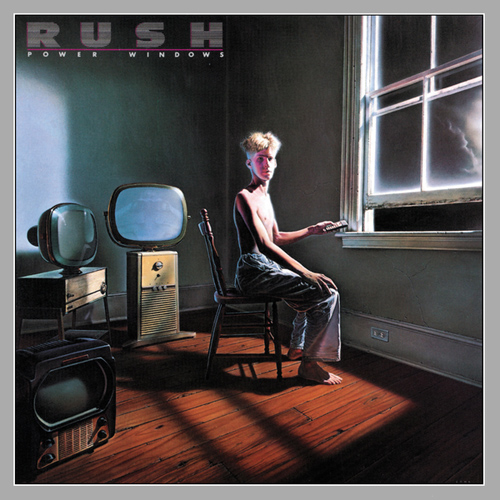
There are many reasons why you should listen to Rush.
They’re incredible musicians. They have, over the years, been as experimental as Radiohead. Neil Peart is unquestionably the best rock drummer alive today. Better even than John Keeble.
But there is just one fly in the ointment…
Back in 1986, undaunted by my premature teenage rejection of 2112 as “hippie nonsense” my Rush-loving friend tried once again to interest me in the band, this time with their new record Power Windows.
It was nothing like the earlier records. In a good way. Synths layered between the clean guitar sounds, an electronic drum kit – it sounded modern. Eighties.
Thankfully, the band had scrubbed up a bit too. They no longer looked like they had covered themselves in glue and gone twirling into a kimono factory. They’d had something of a make over, like Gok Wan had come to see them whilst having an off-day…
I didn’t think much of the cover. In my humble teenage opinion I thought the basic concept of a person sitting on a chair in a room was done more effectively by Ratt’s Invasion of your Privacy.

See if you can spot where Rush went wrong.
Schoolboy error guys. That’s right. The furniture’s too modern.
The lyrics of Big Money and Territories eschewed rock’s fashion for talking about vehicles (Bomber, Wheels of Steel, Aces High, Heading out to the Highway) or girls (just about every song by Kiss, Mötley Crüe, Van Halen). Rush sang about the cheery subject of the cold war: fair enough: for those of us growing up at that time it was considered highly probable that a nuclear war would break out before too long.
Manhattan Project sang about “the pilot of Enola Gay/ flying out of the shockwave/ on that August day”… I looked up “Enola Gay” in an encyclopaedia. Never had to do that with a Kiss lyric. Unless Joy of Sex counts as an encyclopaedia.
You could accuse Rush of being a “thinking person’s rock band”. Before we do that, however, there’s a more fundamental type of band they need to be. And that is a “doesn’t object to Geddy Lee‘s helium-pitched-voice person’s rock band”.
I think of Geddy Lee as being like Cacofonix the Bard from the Asterix books. If you remember, Cacofonix suffered because opinion was divided as to his talents. “He thinks he’s a genius. Everyone else thinks he’s unspeakable…” so the introduction told us. The bard would end up being bound and gagged every time he threatened to burst into song…

Like the fictional Cacofonix, Geddy’s voice (to some people) is as toothache-inducing as hearing knives scratching china, fingernails scraping down a blackboard or seeing a photo of Justin Beiber. I have literally seen someone visibly wince when hearing his singing (and that of Justin Beiber’s for that matter).
When the Allied troops invaded Iraq, there were reports that tank stereos blasted out Metallica’s Enter Sandman to shock the opposition into surrendering. Error. A bit of Rush’s 2112 perhaps or anything from Fly by Night certainly, would have wrapped up that conflict in two weeks. Although it may have contravened the Geneva Convention.
Such is life however. Like beer, Durian Fruit and Scientology, it’s certainly an acquired taste. But I’m not sure Rush would be Rush without it. And The World Needs Rush. If only to show Justin Beiber what a dreadful little pop puppet he is…
Rush’s first album for five years, Clockwork Angels, is released today, 11th June inside a special Rush-devoted issue of Classic Rock Magazine.
Record #56: Rush – Manhattan Project



Leave a comment